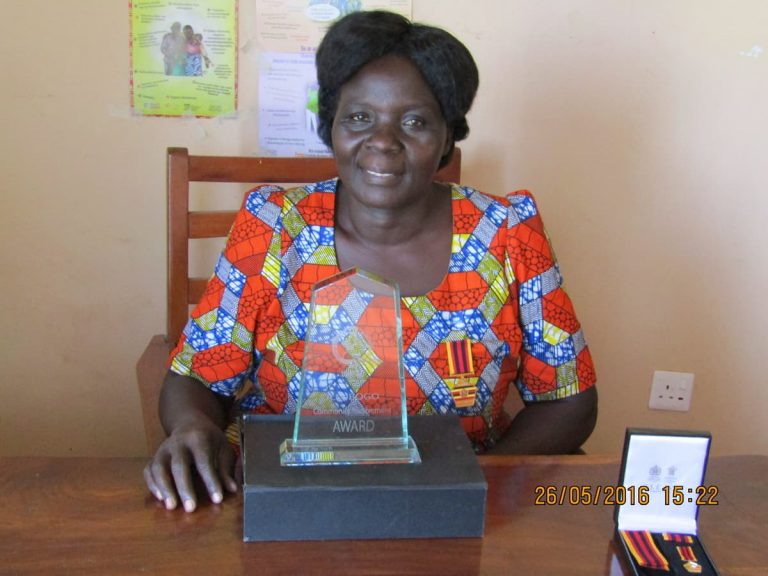Since 2003, Joyce Nangobi has been on a mission to help other women fight corruption. “It started as a necessity”, she says. At the time, families were being illegally evicted from their homes in Jinja, Uganda. With many women widowed or with their husbands away working in urban areas, they were left to fend for themselves and their children.
That year, she along with three others started the Slum Women’s Initiative for Development (SWID). Thirty women were later mobilized to join their efforts. Nearly 10 years on, they’ve grown to over 500 members. “Many women were uneducated and illiterate. They were not aware of their rights, and didn’t know that they could stop authorities from evicting them”. It made them easy targets for corrupt officials. Now they’re an empowered group of women fighting corruption.

Empowering Women to Help Themselves
Under the tagline, “For Grassroots Women, By Grassroots Women”, SWID offers a number of different programs, from the Demo Gardens aimed at teaching the importance of food security, to paralegal training on land ownership and property rights. Women are educated on what they’re entitled to, and are warned about paying money to government officials who promise title deeds and then never follow-through. Nangobi has experienced this first hand. In February this year she paid the fees for documents to prove ownership of one of their offices. The official told her she would have the papers within two weeks. Nearly a year later, she has nothing to show. Nangobi is now fighting to get the title deeds, armed with knowledge she has.
Others, she says, are not as lucky. Like Sylvia Nalubowa. Pregnant with twins, Nalubowa went to her local hospital when she started having contractions. She was reportedly turned away by nurses who allegedly demanded money to call the doctor. The story goes that Nalubowa couldn’t afford to pay them. She was left unattended and died. Nalubowa’s story made the headlines causing national outcry, many stories like that though, remain untold. “What the nurses did was wrong, but we have to look at the cause, not the symptom”. She believes that if the government paid the public healthcare workers a decent salary, they wouldn’t need to solicit bribes: “…That’s the cause that ignites corruption, and it’s grassroots communities that suffer.”

Public Perception of Corruption in Uganda
Transparency International’s 2012 Corruption Perceptions Index lists Uganda at number 130 out of 176 countries [1 being least corrupt, 176 most corrupt]. It was given a score of 29/100 [0 means that a country is perceived as highly corrupt and 100 means it is perceived as very clean]. The organizations’ East African Bribery Index (EABI) paints an equally glum picture. In the survey that ranks the likelihood of the respondent “being asked for or expected to pay a bribe when interacting with a particular sector in the preceding 12 months” – Uganda is placed as the worst country in the region. From police, to city and local councils like those Nangobi has had to deal with, the EABI reports that those institutions “reported about 50 percent probability that as a service seeker you would be required to pay a bribe upon each interaction”. Close to 40 percent of those surveyed say they pay a bribe because they believe it’s the only way to gain access to those services.
When Leaders Fail to Lead
This is the reality Nangobi and others like her face. It doesn’t help that the country’s leaders fail to set a good example. No clearer was this evident than earlier this year, when foreigner donors announced they’d be suspending development aid to the country after an Auditor Generals report revealed that millions of dollars destined to fund the country’s reconstruction was allegedly funneled into officials’ private bank accounts. Again, it’s the poor and most vulnerable who lose out.
At the time, Peter Wandera, Executive Director of Transparency International Uganda released a statement saying: “We strongly believe there [are] enough [resources] for the needs of every Ugandan but not enough for the greed of public servants entrusted to manage resources responsibly for the good of all Ugandans.”
It’s about more than women fighting corruption, says Nangobi. It’s about empowerment. Not just women, but men, and children. While some groups might be more vulnerable than others – like the widowed women in Jinja, or the pregnant mother in Mityana, corruption does not discriminate. It affects us all. To see women fighting corruption is a good thing. It means work is being done. Is it enough? Nangobi admits it never is, but it’s something—a start.

